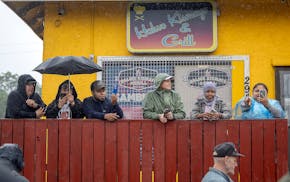The country's largest Muslim civil liberties group must hand over its donor list as part of a sweeping set of documents it must disclose in an ongoing federal defamation suit filed by a former senior leader-turned-suburban city council member.
Lori Saroya, now serving on the Blaine City Council, sued the national Council on American-Islamic Relations (CAIR) in January — two years after the group dropped its own defamation lawsuit against her. A subsequent CAIR news release prompted Saroya's follow-up suit, and now appears to have exposed the organization to a vast list of information to furnish.
Late last month, U.S. Magistrate Judge David Schultz ordered CAIR to turn over most of the discovery Saroya sought as part of her lawsuit. In his ruling, Schultz described how a CAIR news release in which it claimed to have "proved" improper conduct by Saroya — despite having dismissed its case — "opened the door" to a deeper probe of its original case's merits.
"Though CAIR objects to the broad discovery Saroya seeks, that breadth is a self-inflicted wound occasioned by its own press release," Schultz wrote. "In commenting on the merits of the 2021 lawsuit in the manner in which it did, CAIR resuscitated the very issues that had just been laid to rest."
Zachary Alter, an attorney representing CAIR, had argued in a court memo that Saroya was trying "to blur the lines between the 2021 and current lawsuits" to obtain "documents that she hopes will substantiate the hundreds of allegations she has been making against CAIR for eight years and provide additional fodder for additional future statements."
Schultz was unmoved: CAIR's position might be more persuasive, he responded, had CAIR's news release merely outlined the procedural history and significance of the rulings in the 2021 litigation.
"Instead, CAIR stated that '[Saroya] was not able to defeat our lawsuit ... [which] allowed us to prove her conduct,' and that 'we have already proven those facts,'" Schultz pointed out. "A fair reading of the press release, particularly by a lay audience, would permit the reader to infer that Saroya had committed a crime, had defamed CAIR, had interfered with its business and breached her nondisclosure agreement."
Jeff Robbins, an attorney representing Saroya, told the Minnesota Star Tribune this week that Schultz's order "was extremely closely reasoned, meticulous and record-based."
"We look forward to CAIR's compliance with it as the case proceeds to the next phase under the applicable rules," Robbins said in an email.
The parties have determined whether documents such as CAIR's donor lists would be available to the public when they're produced. A message was left seeking comment from CAIR's attorneys.
After CAIR drops suit, a news release prompts Saroya to sue
CAIR fired the first legal salvo in this saga with a 2021 defamation suit accusing Saroya of waging "a systemic and continuous internet smear campaign designed to damage [CAIR's] reputation and to cause it severe economic harm."
The lawsuit said that Saroya "voluntarily resigned" from CAIR after a female staffer accused Saroya of "harassing her to such a degree that the female staffer was contemplating seeking a restraining order." Saroya previously led CAIR's Minnesota chapter from 2007 to 2016 and later worked in its national office as a national chapter development director and board member before resigning in 2018. In 2023, she became the first Muslim and first person of color to serve on Blaine's City Council. She is also the only Democrat on the council.
Saroya claims that she exited CAIR after urging that it investigate sex assault and harassment allegations against several leaders, including one who allegedly "engaged in a pattern of unwelcome and highly inappropriate conduct" toward her. Saroya also publicly accused CAIR of discrimination, retaliating against staffers who tried to unionize, using nondisclosure agreements to stifle misconduct allegations, and financial mismanagement.
According to her own lawsuit, Saroya was owed back wages after resigning and CAIR offered on several occasions to pay her on the condition that she not make negative statements about her former employer.
While defending against CAIR's defamation suit, Saroya sought discovery information regarding CAIR's donor lists and documents she said would outline an "extensive history of engaging in religious and gender discrimination, sexual misconduct and harassment, and retaliation within the national organization and its local chapters."
U.S. District Judge Susan Richard Nelson refused a motion to dismiss the lawsuit filed by Saroya, but CAIR instead opted to drop the case after Nelson later ordered the group to file a new complaint specifying defamation allegations that were legally actionable and not outside a statute of limitations.
In its 2022 news release, CAIR's national board said it decided to drop its suit in order to "get out of the mud with Lori and her anti-Muslim allies." CAIR said it was unwilling to let Saroya use the litigation's discovery process to overwhelm CAIR chapters, drain resources and demand the names of CAIR donors. It said such information had long been sought by "anti-Muslim groups" and suggested that Islamophobic extremists were counting on the legal battle to pit Muslim-Americans against each other."
CAIR said in the release that even though it could have moved forward with the case, it decided to dismiss partly because the litigation "allowed us to prove [Saroya's] conduct: working with Islamophobes, sending hundreds of anonymous emails in the middle of the night attacking our civil rights organization, harassing us and our supporters on social media, among many other things. She did not deny any of these claims in her response to our lawsuit, so we have already proven those facts."
Saroya now alleges that CAIR falsely characterized the outcome of the 2021 lawsuit when it wrote that the litigation "had already allowed us to prove her conduct" and that CAIR had "proven those facts."
Saroya's attorneys have since argued that CAIR's statements, read in the context of the entire news release, may be understood to allege that CAIR won its lawsuit against Saroya on the merits.
Schultz wrote last month that Saroya's requests for information on donors, funding sources and asset ownership was among a batch of discovery requests that the judge characterized as necessary to prove the truth or falsity of Saroya's accusations against CAIR and its affiliates.
Saroya's discovery requests included any documents related to contributions from "any individual or entity within, or any governmental unit of, Saudi Arabia, Qatar or Kuwait between 2007 and 2014." Saroya also asked CAIR to turn over documents related to claims of discrimination, harassment, retaliation, and other misconduct at as well as investigations into those claims. She's asking for policies for whistleblowing and document retention, reports and discussions about CAIR's governance and information lawsuits CAIR filed and legal agreements it joined.
Saroya has said that the 2022 news release prompted online harassment and bullying that caused her to fear for her physical safety and stop attending her mosque. She said that it also interfered with her ability to find work. Saroya is seeking at least $75,000 in compensation and an injunction forcing CAIR to retract its news release and remove it from any public spaces.
When reached for comment earlier this year, a spokesperson for CAIR's national headquarters referred to its original January 2022 news release.
The parties have now been ordered to adhere to a discovery deadline of April 3.
Correction: A previous version of this article incorrectly reported the name of the judge that issued the ruling.

Five members of Minneapolis Highs street gang found guilty of racketeering conspiracy

Midea recalling 1.7 million of its popular air conditioners due to mold concern

Social media, text chains helped anti-ICE protesters get the word out during Minneapolis raid

TSA agents seize two loaded guns on the same day at MSP Airport

